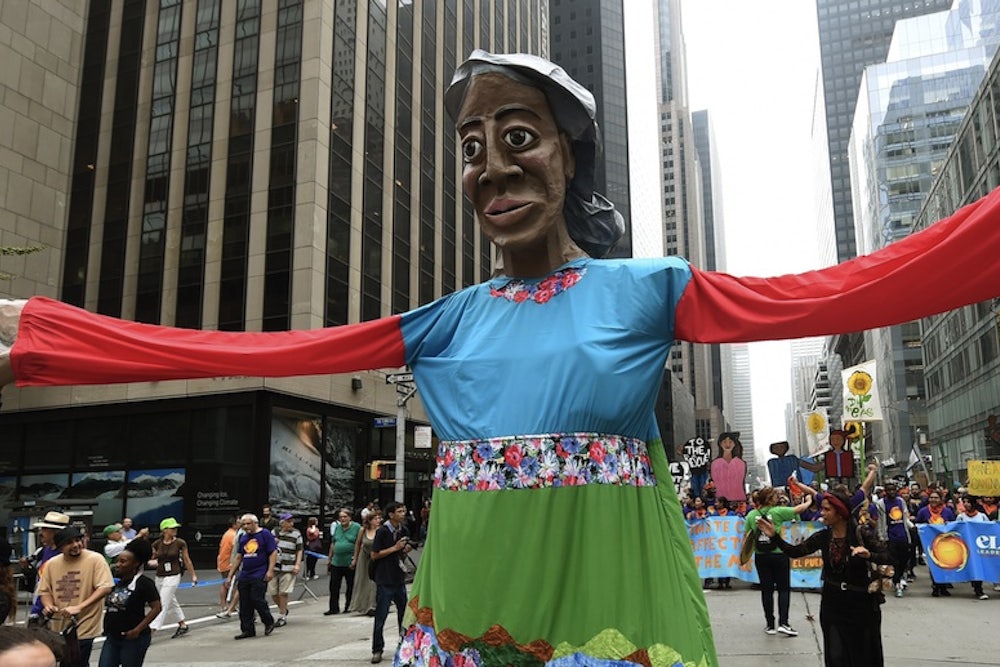If you were paying attention to the news over the weekend, you read or heard about the People's Climate March. It was a genuinely big deal. Organizers say the turnout in New York City, with more than 300,000 people, was four times larger than any climate change march that came before it. The reason it happened this week has to do with the United Nations Climate Summit—also in New York, and also a first of its kind as the largest gathering of world leaders yet on climate policy.
You can read my preview here. To summarize: More than 120 heads of state, NGOs, and businesses will meet. Their goal, basically, is to feel each other out about progress on climate change and encourage one another to make new commitments. People are watching the summit closely, not just for all the speeches and celebrity power, but also because it tells us something about the groundwork being laid for a big international treaty—something environmentalists hope world leaders can reach by the end of 2015.
What we can tell going into this week's flood of climate events is that the world is both in its strongest position in years to take on climate change, but remains saddled with the familiar challenges. Mobilization and activism around the issue are at unprecedented levels. And the U.S. has renewed commitment to greenhouse gas initiatives, while China has indicated it will begin tackling coal pollution more seriously. However, the failure of a major international program, the Green Climate Fund, to meet its target for funding suggests that richer countries are not willing to provide poorer ones with the help they need. And if poorer countries can't get help from richer countries—who, after all, did so much to create the greenhouse gas problem we have today—it's going to be hard for poor countries to do their part now.
—Rebecca Leber
The News
MORE CLIMATE: California Governor Jerry Brown signed a bill to increase electric car use by, among other things, offering extra financial help for low-income consumers. (Los Angeles Times)
ENERGY: John Rockefeller made his money in oil. The foundation his money created just announced it’s divesting from fossil fuels, in order to fight climate change. (New York Times)
HEALTH: A new study suggests disability rates are rising among children, particularly upper-income children. Sarah Kliff (Vox) describes the study and Bill Gardner (The Incidental Economist) offer one theory to explain it.
EBOLA: The Center for Disease Control warned that the worst-case scenario for the Ebola outbreak currently ravaging West Africa has 500,000 or more infections. Scary. (Caroline Chen, Brendan Greeley, and Kelly Gilblom, Bloomberg)
Articles worth reading
A turning point in presidential politics. Matt Bai tells the story of Gary Hart and the Miami Herald reporters who derailed his campaign, forever changing the standards for the private conduct of politicians. Among the revelations: Bai identifies the source who first tipped off the Herald about Hart’s extramarital affairs. (New York Times Magazine)
But not necessarily a turning point in politics. Andrew Gelman, a political scientist at Columbia, corrects one misconception from Bai’s article: Even if Hart had become the nominee in 1988, he probably would have lost the general election to George H.W. Bush. (The Monkey Cage)
Republicans are still calling the unemployed lazy. And Paul Krugman is still explaining how ridiculous that is. (New York Times)
Uber is winning: In the past 15 months, the number of taxi trips in San Francisco has declined by 65 percent. (Michael Cabanatuan, San Francisco Chronicle)
Boehner still doesn't get it: In a speech at the American Enterprise Institute last Thursday, John Boehner continued to blame the unemployed for not finding a job. As Simon Maloy points out, Paul Ryan has spent the past few months shifting away from this message. (Salon)
Stories we’ll be watching
The lead-up to the climate summit.
At QED
Jonathan Cohn reacts to a blockbuster ESPN.com article about the Ray Rice controversy: The NFL comes off badly but the Baltimore Ravens come off even worse. Danny Vinik has figured out how Paul Ryan plans to make his tax plan work: With really creative math. Anna Hiatt explains why unions went green. And if you didn’t see it on Friday, be sure to read Brian Beutler’s story on how the latest plagiarism scandal defines plagiarism way, way down.
